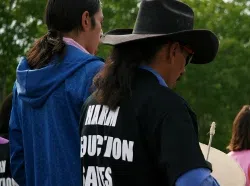
First Nation prepares to launch needle exchange
STURGEON LAKE — During a workshop about HIV on Sturgeon Lake First Nation, Thursday, two elders openly sobbed as they remembered those they have lost because of the virus and addictions.
It was one of the first times people came together on the First Nation to openly talk about those they know who have HIV and AIDS.
In the past years the number of cases of HIV on the reserve, about 50 kilometres northwest of Prince Albert, have increased, with 11 new cases in 2010.
“We feel it’s vital that we need to increase the awareness of HIV and Hep C and all the STI infections that we’re starting to see a trend … the most rapid rise that we saw this past year is the HIV confirmed cases,” said Norma Rabbitskin, the senior health nurse/home-care co-ordinator for the First Nation.

